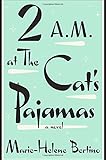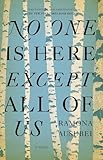John Steinbeck found Of Mice and Men in a poem by Robert Burns; Joan Didion came across Slouching Towards Bethlehem in one by William Butler Yeats. Who’s Afraid of Virginia Woolf? was scrawled in the bathroom stall of a Greenwich Village saloon, which Edward Albee entered in 1954. Many of Raymond Carver’s titles were changed by his longtime editor, Gordon Lish — for better (“Beginners” became “What We Talk About When We Talk About Love”) or worse (“Are These Actual Miles?” was replaced by the vague and perplexing “What Is It?”). F. Scott Fitzgerald first titled his most famous work Trimalchio in West Egg. Though eventually persuaded that The Great Gatsby was less obscure, easier to pronounce, and much preferred by his wife, Zelda, Fitzgerald maintained that the final choice was “only fair, rather bad than good.”
In lieu of a fateful bathroom visit or an assertive editor, how do authors find their titles? Many plumb the work of Shakespeare (Edith Wharton’s The Glimpses of the Moon and David Foster Wallace’s Infinite Jest, as well as a number of titles by Agatha Christie, were all inspired by the Bard); others, religious or not, turn to the old poetry of the Bible. Still more scour their own manuscripts in search of a string of words that might capture the novel’s spirit. And some, like Alice Munro — whose latest title, Dear Life, was taken from a phrase she heard as a child — find that the perfect moniker was in them all along. Still, the process of titling remains individualized and mysterious: methods range from intuition to reason, from revelation to painful labor. Here, five contemporary authors tell us about theirs.
 Marie-Helene Bertino, author of 2 A.M. at the Cat’s Pajamas:
Marie-Helene Bertino, author of 2 A.M. at the Cat’s Pajamas:
I knew my debut novel’s title would finish with the clause The Cat’s Pajamas, however I heard the beginning of the phrase only as a rhythm. It sounded like: Something something something The Cat’s Pajamas. When I realized the missing phrase included “2 a.m.” (the time bars close in Philadelphia, where the novel is set), it prompted me to clarify the 24-hour nature of the novel and use hours of the day instead of chapter headings. Then, all I had to do was figure out what happened at that fateful hour. For weeks, this question rotated in my subconscious as I conducted the errands of my life: what happens at 2 a.m.? WHAT HAPPENS AT 2 A.M.? Whatever it was had to synthesize what up until then are disparate story lines while staying true to my desire to keep the stakes realistic. I ticked through all the possible tricks: murder, mass suicide, alien invasion, but knew the answer would be somewhere in subtle middle distance, harder to write, but closer to the way I’ve found life actually works. One of the unexplainable mysteries of writing fiction is that I normally begin already knowing the title and last line. I can’t explain why. It’s a mystery. The stories for which I don’t already know these elements take longer. Perhaps because something hasn’t quite distilled, and my conception is still a piece of sand, battling a shell to turn itself into a pearl.
 Ted Thompson, author of The Land of Steady Habits:
Ted Thompson, author of The Land of Steady Habits:
When it was finally time to submit my novel to publishers, I had no title. I sat for a full day in utter paralysis, staring at the title page, my cursor blinking in 24-point font. I would type whatever came to mind, most of it nonsense, just to see how it looked, and it all looked ridiculous. I had spent the previous week taking long walks and speaking aloud every term that came into my mind when I thought of the manuscript, an embarrassing voice recording of my attempts to seem smart. I went to Shakespeare — King Lear! I thought, there are some similarities, aren’t there? Old guys, unraveling families. Never mind the fact that I had never really understood that play, not really, and didn’t then when I skimmed it looking for my answer. Finally, I wrote my friend Stuart, who was one of the only writers I knew who didn’t overthink things. He wrote back a few minutes later with a list of trivia about Connecticut. Facts and data, all surface details. Stuff that seemed hopelessly superficial. But there, at the bottom, under a list of nicknames was “the land of steady habits.” And that was that.

 Ramona Ausubel, author of A Guide to Being Born and No One Is Here Except All of Us:
Ramona Ausubel, author of A Guide to Being Born and No One Is Here Except All of Us:
Some titles come at me, wham, even before the story. I wrote the story “Welcome to Your Life and Congratulations” after that sentence somehow appeared in my brain, having no idea what the story would be about. Other titles are fought for. For a good while, my first novel was titled The Constellation Makers, which is not a good title at all (I knew that, fortunately). I had a long list of titles but I can’t remember the others because once I thought of No One is Here Except All of Us (which I took from a sentence in the book), I knew it was right and it never changed. However, I assumed that if I was ever lucky enough to get the thing published, surely the publisher would nix my long, complicated title. I assumed they would want something snappy (and that I’d hate it). This is not at all what happened and I was so glad that I had gone for the thing I wanted instead of guessing at the desires of the industry—turns out uniqueness, at least in this case, was an asset. Whatever the journey to a title, whether based on list-making and brainstorming and bouts with Thesaurus.com or one of those beautiful revelatory moments, I know the right title by instinct more than reason.
Said Sayrafiezadeh, author of Brief Encounters with the Enemy and When Skateboards Will Be Free:
I titled my short story collection, Brief Encounters With the Enemy after one of the stories, A Brief Encounter With the Enemy. I know this may appear like an uninspired choice—indeed, it took me about one minute to come up with it—but I intended some subtlety behind it. For one thing, pluralizing the title helped to thematically link the eight stories, but more important is that it raised the question: who exactly is this enemy we keep encountering, and why? I’ll leave that up to each reader to decide.
 Matthew Thomas, author of We Are Not Ourselves:
Matthew Thomas, author of We Are Not Ourselves:
I had been working with another title, The Real Estate of Edmund Leary, which I liked for the double-duty “real” was doing, but I didn’t prefer to include the name of a character in the title, particularly when the book was more explicitly Eileen’s than it was Ed’s. While re-reading Lear in preparation to teach it, I came to the line in Act 2, Scene 4, where Lear is wondering why Cornwall won’t appear, even though he’s been ordered to. To explain away the offense to his ego, Lear says, “Infirmity doth still neglect all office/Whereto our health is bound”—i.e., sickness prevents us from doing the duties we’re required to do when healthy. The next line elaborates on this theme: “We are not ourselves/when nature, being oppressed, commands the mind/to suffer with the body.” Lear justifies Cornwall’s flouting of his authority by appealing to the universal experience of being beholden to our bodies: when the body isn’t working, the mind doesn’t work perfectly either. I found rich resonance in the idea of locating both the mind and the body in Lear’s formulation in the brain, so that the body that isn’t working is the mind, in fact — and then positing the mind in Lear’s formulation as what we think of as the spirit, the soul, the personality. When the brain isn’t working at its optimal best — when there’s an obstruction of function through illness, or a fixation or obsession that springs from traumatic early childhood experiences — the animating spirit of the person, what we think of as personality, is impaired as well.
The phrase struck me immediately as being at the heart of my concerns in the book. We Are Not Ourselves suggests characters who are not at their best, who by dint of circumstances are not allowed to be themselves. It also suggests that we’re always learning and evolving, that we’re works-in-progress. We are not ourselves yet, in a sense; there’s hope in that. In a different vein, we are not reducible to whom we appear to be in our biographies. We contain multitudes in our rich internal lives that our lived lives don’t reveal. Another resonance for me is that we need each other to experience the full flowering of our humanity and our greatest happiness. We are not only ourselves; we are not islands unto ourselves. I liked that the phrase opened up fields of interpretation that would extend beyond the more circumscribed concerns of my original title, so I grabbed it and didn’t look back. As soon as I knew it was the title, it was as if it had been the title all along.








